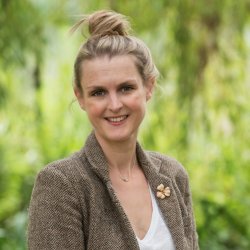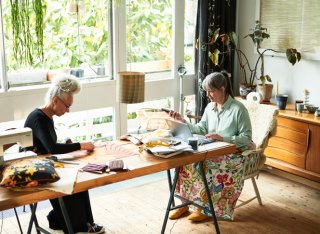
Dr Carys Banks
Academic and research departments
Faculty of Health and Medical Sciences, School of Health Sciences.About
Biography
Carys is a Research Fellow within the School of Health Sciences, based in the Workforce, Organisation and Wellbeing (WOW) research theme.
As an anthropologist working in health and care settings, Carys's interests focus on relations of care fostered in these environments and what this indicates about the human condition. Predominantly working ethnographically allows Carys to spend long periods with people, to focus on the minutiae of their everyday lives to understand how these often seemingly mundane encounters reveal something more fundamental about our lived experiences of the world.
Carys has particular expertise and interest in the care of people with learning disabilities. In 2021 she was awarded a prestigious NIHR Advanced Fellowship award which will seek to co-design an intervention that will assist social care staff in better supporting people with learning disabilities to be socially connected in their lives. More information can be found on her University of Surrey Project Page.
At Surrey, Carys works closely with Professor Caroline Nicholson and Professor Jill Maben in the School of Health Sciences. She is also informally mentored by Dr Hrafn Asgeirsson, a Senior Lecturer in Philosophy and Law.
Areas of specialism
University roles and responsibilities
- Member of Workforce, Organisation and Wellbeing (WOW) research theme, School of Health Sciences, University of Surrey.
- Member of Equality, Diversity and Inclusion ECR group, University of Surrey
Previous roles
Business, industry and community links
News
In the media
ResearchResearch interests
In 2022 I began an NIHR Advanced Fellowship: Conceptualising loneliness for people with learning disabilities (PwLD): a co-designed intervention to support social connectedness in social care settings. People with learning disabilities living in full time support are vulnerable in specific ways to experiencing loneliness. Staff in these settings are ideally placed to facilitate better social connectedness, but remain an underused resource. This study seeks to co-deign an intervention, producing guidance and training to assist staff in better helping people with learning disabilities to be more socially connected in their lives. More information can be found on my University of Surrey Project Page.
My work to date has focused on care for adults with learning disabilities and in particular how policy and service approaches are underpinned by liberal values which promote independence and choice for users of services. Although these values are important, focusing overwhelmingly on them can mean that other aspects of care, such as dependence, vulnerability and social and emotional connectedness can be neglected.
My doctoral research comprised an ethnographic study of how government policy focusing on independence and choice is experienced by people with learning disabilities and the staff supporting them in everyday care settings. I found that there are limits to learning disability policy and practice organised around these kinds of empowerment approaches because they can risk discounting the needs that people experience as a result of their condition(s). I also found that in focusing heavily on professional boundaries in support settings, everyday care providers are unintentionally at risk of depriving people with learning disabilities of important emotional connections with others around them.
I am interested in experimenting with the medium of film in research, particularly in the context of working with people with cognitive impairments who can encounter difficulties in expressing their thoughts and experiences verbally. I am keen to incorporate filmmaking into future research endeavours and I am open to potential collaborations with academics and non-academics interested in applying this approach in innovative ways.
Research projects
Indicators of esteem
My doctoral research was awarded the 2016 Radcliffe Brown/Sutasoma Award from the Royal Anthropological Institute (RAI). This is ‘a starred award and given to students of exceptional quality in recognition of doctoral research that is of potentially outstanding quality and likely to make an important contribution to social anthropology’.
Research interests
In 2022 I began an NIHR Advanced Fellowship: Conceptualising loneliness for people with learning disabilities (PwLD): a co-designed intervention to support social connectedness in social care settings. People with learning disabilities living in full time support are vulnerable in specific ways to experiencing loneliness. Staff in these settings are ideally placed to facilitate better social connectedness, but remain an underused resource. This study seeks to co-deign an intervention, producing guidance and training to assist staff in better helping people with learning disabilities to be more socially connected in their lives. More information can be found on my University of Surrey Project Page.
My work to date has focused on care for adults with learning disabilities and in particular how policy and service approaches are underpinned by liberal values which promote independence and choice for users of services. Although these values are important, focusing overwhelmingly on them can mean that other aspects of care, such as dependence, vulnerability and social and emotional connectedness can be neglected.
My doctoral research comprised an ethnographic study of how government policy focusing on independence and choice is experienced by people with learning disabilities and the staff supporting them in everyday care settings. I found that there are limits to learning disability policy and practice organised around these kinds of empowerment approaches because they can risk discounting the needs that people experience as a result of their condition(s). I also found that in focusing heavily on professional boundaries in support settings, everyday care providers are unintentionally at risk of depriving people with learning disabilities of important emotional connections with others around them.
I am interested in experimenting with the medium of film in research, particularly in the context of working with people with cognitive impairments who can encounter difficulties in expressing their thoughts and experiences verbally. I am keen to incorporate filmmaking into future research endeavours and I am open to potential collaborations with academics and non-academics interested in applying this approach in innovative ways.
Research projects
Indicators of esteem
My doctoral research was awarded the 2016 Radcliffe Brown/Sutasoma Award from the Royal Anthropological Institute (RAI). This is ‘a starred award and given to students of exceptional quality in recognition of doctoral research that is of potentially outstanding quality and likely to make an important contribution to social anthropology’.
Supervision
Postgraduate research supervision
I welcome enquiries from students seeking supervision in areas including:
- Anthropology of health and social care
- Applied health and social care research
- Ethnographic methods
- Qualitative research with people with learning disabilities
- Ethical and philosophical tensions in the care of people with disabilities.
Completed postgraduate research projects I have supervised
Teaching
June 2010: Training and research dissemination workshop for clinical staff at Addenbrookes Hospital, Cambridge.
Oct 2013: Teaching session to Social Pedagogy students, Department of Health and Society, University of Malmö, Sweden.
2015-2016: Teaching assistant for the Chinese stream for the MA in Interpreting and Translating (MAIT) (THPL-AFM31), University of Bath.
Publications
Highlights
Banks, C. (2021). Loneliness in the lives of people with learning disabilities: where are we going wrong? Academia Letters, Article 264. https://doi.org/10.20935/AL264
Adams, M., Kelly, D., Maben, J., Mannion, R., Banks, C., & Jones, A. (2020). How do “heroes” speak up? NHS staff raising concerns during covid-19. [Online]. blogs.bmj.com: BMJ Publishing Group. https://blogs.bmj.com/bmj/2020/08/11/how-do-heroes-speak-up-nhs-staff-raising-concerns-during-covid-19/
Jones, A., Blake, J., Banks, C., Adams, M., Kelly, D., Mannion, R., & Maben, J. (2021). Speaking up about bullying and harassment in healthcare: reflection and analysis on worker well-being and patient safety following the introduction of an innovative new role in NHS England. In Montgomery A (ed.). Connecting Healthcare Worker Well-Being, Patient Safety and Organisational Change: The Triple Challenge. Aligning Perspectives on Health, Safety and Well-Being, pp. 145-161. Springer Publishing. https://link.springer.com/chapter/10.1007%2F978-3-030-60998-6_10
Banks, C.A., D. Wainwright, R. Gooberman-Hill. (2020). An ethnography exploring the limits of dedifferentiation in the lives of adults with learning disabilities. Special Issue in Journal of Intellectual and Developmental Disability. https://www.tandfonline.com/doi/full/10.3109/13668250.2020.1799161
Banks, C.A. (2019). Professional distance versus human touch. Community Living. https://www.cl-initiatives.co.uk/professional-distance-versus-human-touch/
Banks, C.A. (2019). Care in the 21st century: what can mainstream services learn from the Camphill movement? Alliance for Camphill. https://www.allianceforcamphill.com/post/manage-your-blog-from-your-liv…
Banks, C.A. (2019). Analysing Ethnographic Research Methods: The Importance of Retaining Immersion During the Analytic Process Using Research From UK-Based Learning Disability Social Care Settings. SAGE Research Methods datasets. https://dx.doi.org/10.4135/9781526495990
Banks, C.A. (2018). Sometimes people with learning disabilities need a hug – but support staff aren’t meant to give them. In: The Conversation. https://theconversation.com/sometimes-people-with-learning-disabilities-need-a-hug-but-support-staff-arent-meant-to-give-them-100709
Banks, C.A. (2018). Working through ethical and emotional concerns and uncertainties in ethnographic research with people with learning disabilities. In Ethnographies and Health: Reflections on Empirical and Methodological Entanglements. E. Garnett, J. Reynolds & S. Milton (eds.). Palgrave macmillan. https://doi.org/10.1007/978-3-319-89396-9_2
Banks, C.A. (2015). Lifting the veil on concealed vulnerability: the impact of the ethnographic experience. Medical Anthropology Theory. http://www.medanthrotheory.org/article/view/5672
Banks, C. (2013). Social Care Support within UK-Based Supported-Living Homes for Adults with Intellectual Disabilities: A Qualitative Interview Study of Support Workers' Accounts of the Nature of Everyday Care and Support. SAGE Research Methods Cases. dx.doi.org/10.4135/978144627305013501439
Redley, M., Banks, C., Foody, K., and Holland, A. (2012). Healthcare for men and women with learning disabilities: understanding inequalities in access. Disability & Society, 27(6), pp. 747–759. https://doi.org/10.1080/09687599.2012.673080
Banks, C. (2012). Interpreting and ‘doing’ empowerment and protection care imperatives in a supported-living environment for intellectually disabled adults: findings from an ethnographic study. Suomen Antropologi: Journal of the Finnish Anthropological Society, 37(3), pp.75-88. https://researchportal.bath.ac.uk/en/publications/everyday-ethnography-interpreting-and-doing-empowerment-and-prote
Banks, C. A., K. Foody, M. Redley and A. J. Holland 2010. Report to the Cambridgeshire Learning Disability Partnership Board: Understanding the Access and Provision of Healthcare to Adults with Learning Disabilities in Cambridgeshire. Cambridge: Cambridgeshire County Council.
Banks, C. and Redley, M. (2009). IMCAs in their second year: the experience of key stakeholders. The Second Year of the Independent Mental Capacity Advocacy Service: 2008-2009, London: Department of Health, pp. 44-54.
